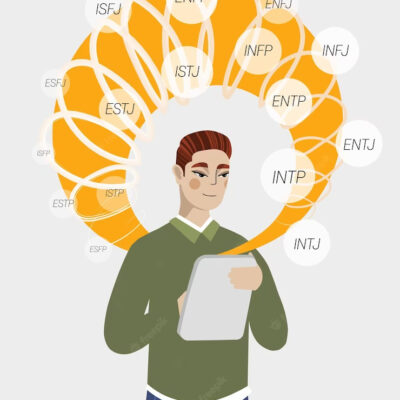Hey there, have you ever taken a personality test and wondered what it all means? Well, if you’re an ISFJ, you’re in luck because we’re about to dive into the world of the “Protector” personality type. Individuals with the ISFJ Personality Type are known for their loyalty, practicality, and attention to detail. They’re the kind of people who always have your back and will go above and beyond to help you out.
This personality type makes up about 13% of the general population and is one of the most common types among women. ISFJs are known for their sense of duty, loyalty, and practicality. They are responsible and hardworking individuals who excel in tasks that require attention to detail, follow-through, and organization.
Description of ISFJ Personality Type
Overview of the personality type
ISFJ is one of the 16 personality types identified by the Myers-Briggs Type Indicator (MBTI), which is a popular personality assessment tool. ISFJ stands for Introverted, Sensing, Feeling, and Judging. This personality type is also known as the “Protector” due to their strong sense of responsibility and dedication to helping others.
Key characteristics of the personality type
ISFJs have a number of key characteristics that define their personality. Some of these include:
- Introverted: ISFJs tend to be reserved and prefer to focus on their inner thoughts and feelings rather than the external world.
- Sensing: ISFJs are detail-oriented and rely on their senses to gather information about the world around them.
- Feeling: ISFJs are empathetic and value harmonious relationships. They often make decisions based on their emotions and how others will be affected.
- Judging: ISFJs like to plan and prefer structure and order in their lives. They are often very organized and dependable.
Examples of famous people with the personality type
There are many famous people who have been identified as ISFJs. Here are just a few examples:
- Queen Elizabeth II: The current Queen of England is known for her sense of duty and strong work ethic, which are typical traits of the ISFJ personality type.
- Mother Teresa: The Catholic nun and humanitarian is admired for her selfless dedication to helping the poor and vulnerable, which is a key characteristic of ISFJs.
- Kate Middleton: The Duchess of Cambridge is known for her poise and elegance, as well as her dedication to her family and charitable causes – all traits that align with the ISFJ personality type.
- Jimmy Carter: The former US president is often praised for his integrity and commitment to social justice, which are values that are important to many ISFJs.
These examples demonstrate how ISFJs can be found in a variety of roles and industries, but they share common traits and values that define their personality type.
Strengths of ISFJ Personality Type
Positive traits associated with the personality type
ISFJs have a number of positive traits that make them valuable contributors in many settings. Some of these traits include:
- Loyalty: ISFJs are fiercely loyal to their friends and family. They are committed to supporting and helping those they care about, and will go to great lengths to ensure their well-being.
- Dependability: ISFJs are reliable and responsible individuals. They are often seen as the “glue” that holds groups and organizations together, as they can be counted on to follow through on their commitments.
- Practicality: ISFJs are grounded in reality and have a practical, common-sense approach to problem-solving. They are skilled at identifying and addressing practical issues in a systematic and efficient way.
- Attention to detail: ISFJs are meticulous and detail-oriented. They have a keen eye for spotting errors and inconsistencies, and are dedicated to ensuring that everything is done correctly and to a high standard.
Examples of how these strengths can be beneficial in different situations
ISFJs’ strengths can be beneficial in a variety of settings, including:
- Relationships: ISFJs’ loyalty and dependability make them excellent partners and friends. They are always willing to lend a listening ear or a helping hand, and are committed to supporting their loved ones through thick and thin.
- Work: ISFJs’ practicality and attention to detail make them ideal employees in many industries. They are skilled at identifying and addressing practical issues, and are dedicated to ensuring that everything is done correctly and to a high standard.
- Community: ISFJs’ commitment to social responsibility and helping others makes them valuable members of any community. They are often involved in charitable organizations and volunteer work, and are dedicated to making a positive impact on the world around them.
Real-life examples of successful individuals with the personality type
There are many successful individuals who have been identified as ISFJs. Here are just a few examples:
- Jeff Bezos: The founder of Amazon.com is known for his practicality and attention to detail, which are characteristic traits of the ISFJ personality type.
- Queen Elizabeth II: The current Queen of England is admired for her sense of duty and strong work ethic, which are common traits among ISFJs.
- George H.W. Bush: The former US president is often praised for his loyalty and dependability, which are hallmarks of the ISFJ personality type.
These examples demonstrate how ISFJs’ strengths can be applied in a variety of fields and contexts to achieve success and make a positive impact on the world.
Weaknesses of ISFJ Personality Type
Negative traits associated with the personality type
While ISFJs have many strengths, they also have a number of weaknesses that can be problematic in certain situations. Some of these weaknesses include:
- Inflexibility: ISFJs can be resistant to change and may struggle to adapt to new situations or ideas.
- Overly selfless: ISFJs may prioritize the needs of others over their own needs, to the point where they neglect their own well-being.
- Difficulty with conflict: ISFJs may have difficulty confronting others or expressing their own needs and opinions in situations where there is conflict or disagreement.
- Difficulty with abstract concepts: ISFJs may struggle with abstract or theoretical concepts, preferring instead to focus on concrete, practical details.
Examples of how these weaknesses can be detrimental in different situations
ISFJs’ weaknesses can be problematic in a variety of settings, including:
- Relationships: ISFJs’ tendency to prioritize others over themselves can lead to feelings of resentment and burnout in relationships, as they may neglect their own needs and desires.
- Work: ISFJs’ inflexibility and difficulty with abstract concepts may limit their ability to adapt to new technologies or new ways of thinking, which can be a disadvantage in some industries.
- Leadership: ISFJs’ difficulty with conflict and assertiveness may make it challenging for them to lead effectively, particularly in situations where they need to make tough decisions or confront difficult issues.
Strategies for managing these weaknesses
Fortunately, there are strategies that ISFJs can use to manage their weaknesses and work towards personal growth and development. Some strategies to consider include:
- Developing a growth mindset: ISFJs can work on developing a more open and flexible mindset, which will allow them to adapt more easily to new situations and ideas.
- Setting boundaries: ISFJs can work on setting boundaries and prioritizing their own needs, which will help them avoid burnout and improve their overall well-being.
- Practicing assertiveness: ISFJs can work on developing assertiveness skills, which will help them better express their own needs and opinions in situations where there is conflict or disagreement.
- Seeking out new experiences: ISFJs can work on seeking out new experiences and ideas, which will help them broaden their horizons and develop their abstract thinking skills.
By taking these steps, ISFJs can learn to manage their weaknesses and leverage their strengths to achieve success and fulfillment in all areas of their lives.
Relationships and Communication
How the ISFJ personality type interacts with others
ISFJs are often warm and compassionate individuals who enjoy helping others. They value stability, loyalty, and tradition, and they tend to be highly attuned to the emotional needs of those around them. In social situations, ISFJs may be reserved at first but can be warm and engaging once they feel comfortable.
Common communication styles of the ISFJ personality type
ISFJs tend to communicate in a clear and straightforward manner, preferring concrete details and practical examples over abstract or theoretical concepts. They may have a tendency to avoid conflict or difficult conversations, but when they do need to address an issue, they will often do so in a respectful and tactful way.
ISFJs may also use non-verbal communication to express their feelings and intentions, such as through body language or tone of voice. They may be attuned to the emotions of those around them, and may adjust their communication style accordingly in order to maintain harmony and avoid conflict.
Tips for communicating effectively with someone of the ISFJ personality type
If you are communicating with an ISFJ, it can be helpful to keep the following tips in mind:
- Be respectful: ISFJs value respect and tradition, so it is important to approach them with a respectful and courteous demeanor.
- Provide concrete examples: ISFJs prefer concrete examples and practical details, so try to provide specific examples when making a point or explaining a concept.
- Be patient: ISFJs may take time to warm up in social situations, so be patient and give them space to feel comfortable.
- Avoid conflict: ISFJs may struggle with conflict or confrontation, so try to approach difficult conversations in a calm and tactful manner.
- Listen actively: ISFJs value empathy and understanding, so make sure to actively listen to what they are saying and validate their feelings and perspectives.
By following these tips, you can communicate effectively with an ISFJ and build strong, meaningful relationships with them.
Careers and Work Habits
Ideal work environment for the ISFJ personality type
ISFJs thrive in environments that offer stability, structure, and clear expectations. They prefer to work in settings that allow them to utilize their organizational skills, attention to detail, and sense of responsibility. They also appreciate environments that value loyalty, teamwork, and collaboration.
Common career paths for the ISFJ personality type
ISFJs tend to excel in careers that require attention to detail, reliability, and a strong work ethic. Some common career paths for ISFJs include:
- Healthcare: ISFJs may excel in healthcare careers such as nursing, medical assisting, or medical administration, where their attention to detail and compassionate nature can be put to good use.
- Education: ISFJs may also find fulfillment in careers in education, such as teaching or school administration, where they can utilize their organizational skills and desire for structure.
- Customer service: ISFJs may excel in customer service roles, where they can provide personalized and attentive service to clients or customers.
- Administration: ISFJs may also find success in administrative roles, where their attention to detail and sense of responsibility can be utilized in managing tasks and projects.
Work habits and behaviors of the ISFJ personality type
ISFJs tend to be highly organized, responsible, and reliable in their work habits. They are often diligent and detail-oriented, and may excel in tasks that require careful attention to detail. They may also be motivated by a sense of duty and responsibility, and may take their work very seriously.
ISFJs may also benefit from clear instructions and expectations in their work environment, as they prefer structure and routine. They may struggle in environments that are chaotic or unpredictable, or where they are required to make frequent decisions without clear guidelines.
ISFJs may also be prone to overworking or taking on too much responsibility, as they may feel a strong sense of duty to their work or team. It is important for ISFJs to set healthy boundaries and practice self-care in order to avoid burnout.
Personal Growth and Development
Challenges and opportunities for personal growth for the ISFJ personality type
While ISFJs have many strengths, they may also face challenges in their personal growth and development. Some common challenges for ISFJs include:
- Overcommitting: ISFJs may struggle with saying “no” to others, leading to overcommitment and burnout.
- Resistance to change: ISFJs may be resistant to change, and may struggle to adapt to new situations or ideas.
- Difficulty expressing emotions: ISFJs may have difficulty expressing their emotions to others, and may struggle with conflict resolution or expressing their needs in relationships.
Strategies for overcoming common obstacles associated with the ISFJ personality type
Fortunately, there are strategies that ISFJs can use to overcome these challenges and continue to grow and develop. Some strategies for ISFJs include:
- Setting boundaries: ISFJs may benefit from setting clear boundaries with others and learning to say “no” when necessary to avoid overcommitment.
- Practicing flexibility: ISFJs may benefit from practicing flexibility and being open to new ideas and experiences, even if they initially feel uncomfortable.
- Developing emotional awareness: ISFJs may benefit from practicing mindfulness or journaling to better understand their emotions and communicate them to others.
Examples of individuals who have successfully navigated personal growth and development with this personality type
Many successful individuals have exhibited the traits and strengths of the ISFJ personality type, while also overcoming their challenges. For example:
- Queen Elizabeth II: Queen Elizabeth II is known for her sense of duty and responsibility, as well as her strong organizational skills and attention to detail. She has also adapted to the changing demands of her role over the years, demonstrating flexibility and adaptability.
- Mother Teresa: Mother Teresa, known for her compassion and dedication to serving others, exemplified the ISFJ personality type. Despite facing numerous challenges in her work, she remained committed to her mission and found ways to adapt and overcome obstacles.
- Jimmy Carter: Former U.S. President Jimmy Carter is known for his integrity, compassion, and dedication to public service. He demonstrated a strong sense of duty and responsibility throughout his presidency and beyond, and has continued to work towards humanitarian causes in his later years.
In conclusion, ISFJs are a fascinating personality type with a unique set of strengths and weaknesses. Their caring and dependable nature makes them great friends and colleagues, but they may struggle with asserting themselves and setting boundaries. By understanding their strengths and weaknesses, ISFJs can navigate their relationships and careers more effectively and work towards personal growth and development. Remember, everyone is different and there is no “perfect” personality type. Embrace your own unique traits and learn to work with them to achieve your goals.
This piece is a preserved fossil from our earlier ecosystem—beautiful, but part of a simpler food chain. The evolution has been… spectacularly messy. If the core of this resonated with you, your soul might be ready for the full, neurodivergent taxonomy. The journey continues. If you’d like to fuel the next phase of exploration, you can support it here.
Also read: Understanding the 16 MBTI Personality Types: A Comprehensive Overview











No Comment! Be the first one.